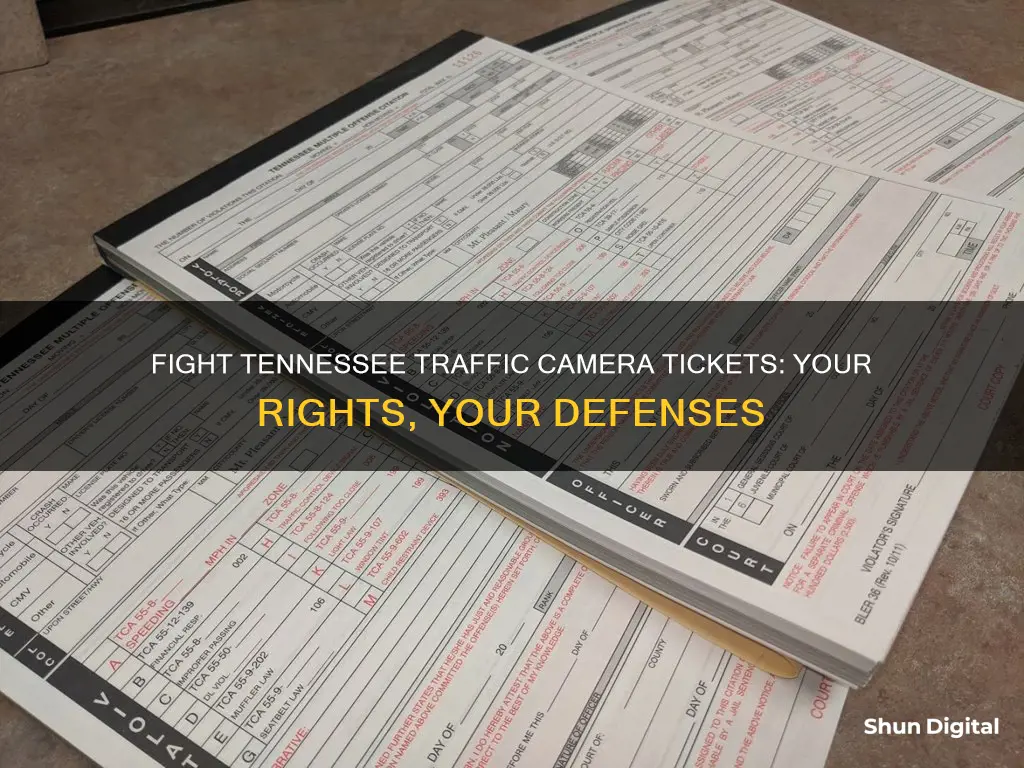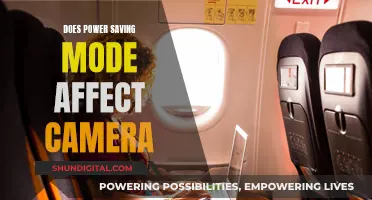
If you've received a traffic ticket in Tennessee, you may be wondering if it's worth contesting it. The short answer is yes—it may be worthwhile to fight a traffic ticket, especially if you believe you have the means to prove it was issued unfairly. Here's what you need to do: First, plead not guilty to the charges. This is typically done by entering your plea to the municipal or city court in charge of your case before the hearing date printed on your ticket. If you're found guilty, you may face consequences like enrolling in a driving school, a suspension of your driver's license, and added points to your driving record. However, if you win your case, you can avoid these penalties and keep your record clean. So, if you think you have a strong case, it may be worth taking the time to contest your traffic ticket in Tennessee.
| Characteristics | Values |
|---|---|
| First step | Plead "not guilty" to the charges |
| Plea submission | Enter the plea online or via mail to the municipal or city court in charge of the case |
| Plea deadline | On or before the hearing date printed on the ticket |
| Court appearances | Pre-trial conference and trial before a judge |
| Legal representation | Hire a traffic ticket lawyer, especially if facing multiple and/or serious charges |
| Court-appointed counsel eligibility | If a guilty verdict could result in incarceration and the defendant cannot afford an attorney |
| Pre-trial conference | Negotiate a settlement with the prosecutor, which usually involves changing the plea to guilty and reducing penalties |
| Trial before a judge | Opening arguments, presentation of evidence and witnesses, cross-examination, closing arguments, and verdict |
| Appeal process | File a Notice of Appeal with the Tennessee circuit court within 10 days (excluding Sundays) of receiving a guilty verdict |
| Case outcome consequences | If the defendant loses the case, they may face penalties such as mandatory enrollment in a defensive driving course, points added to their record, and a suspended driver's license. If they win, there will be no fines or penalties, and all charges will be dismissed. |
What You'll Learn

Plead not guilty
If you want to contest a traffic camera ticket in Tennessee, the first step is to plead "not guilty" to the charges. This is done by entering your plea to the municipal or city court in charge of your case on or before the hearing date printed on your ticket. You can find more specific information on how and where to plead not guilty on your traffic citation.
When you plead "not guilty", you are exercising your legal right to stand before a judge and make a case for your innocence. It also means that you confirm you have the time to appear in court, possibly on multiple occasions, and that you understand the potential consequences of a conviction. These may include jail time for serious charges, additional points on your driving record, and increased insurance rates.
If you plead "not guilty", the court will assign you a date for your pre-trial conference. It is important to attend all scheduled court appearances, as failing to do so can result in a license suspension. If you need to reschedule a court date or have further questions, you can contact the municipal or city court handling your case.
After pleading "not guilty", you will have the opportunity to negotiate a settlement at the pre-trial conference. This usually involves changing your plea to guilty in exchange for reduced penalties. If a settlement cannot be reached, the court will assign a date for your trial before a judge.
During the trial, both sides will present their arguments, witnesses may be cross-examined, and the judge will issue a verdict. If you are found guilty, the judge will announce your sentence. You have the right to appeal a conviction by filing a Notice of Appeal with the Tennessee circuit court within 10 days (excluding Sundays) of receiving the guilty verdict.
The Evolution of Disposable Cameras: Still Relevant Today?
You may want to see also

Employ a traffic attorney
If you've received a Tennessee traffic ticket, you may be able to prove it was issued unfairly and contest it in court. Offenders are generally advised to employ the services of a competent traffic attorney and plead not guilty to the traffic violation.
- A traffic attorney can increase your chances of winning the case. They understand the vehicle code and are familiar with the officers and judges in charge of these cases.
- A traffic attorney can guide you through the complex procedures of Tennessee traffic court. They can help you build a strong case and present it effectively.
- A traffic attorney can save you time and stress by handling the legal proceedings on your behalf. They can also advise you on the best course of action to take, based on your specific circumstances.
- A traffic attorney can help you avoid harsh penalties such as a suspended driver's license, added points to your driving record, and increased insurance rates.
- A traffic attorney can negotiate with the prosecution for a reduced charge or penalty on your behalf.
When choosing a traffic attorney, it is important to consider their credentials, costs, and whether you feel comfortable working with them. It is also advisable to research their success rate in handling similar cases.
History of Pentax 6x7: A Camera Classic
You may want to see also

Send plea by mail or online
To contest a traffic camera ticket in Tennessee, you can send your plea by mail or online. This is a viable option if you believe you have the means to prove that the ticket was issued unfairly. The first step is to plead "not guilty" to the charges. You must do this on or before the hearing date printed on your ticket. The specific information on how and where to plead not guilty can be found on your traffic citation.
Once you've entered your plea, the court will assign you a date for your pre-trial conference. It is important to note that if you miss any scheduled court appearances, your driver's license will be suspended. During the pre-trial conference, you or your attorney and a Tennessee state prosecutor will attempt to negotiate a settlement. Accepting a pre-trial settlement allows you to avoid going to trial. However, it usually requires changing your plea to guilty and accepting reduced penalties for your charges.
If a settlement cannot be reached, the Tennessee municipal or city court will assign you a date to appear for a trial before a judge. During the trial, both sides will present their arguments, witnesses may be cross-examined, and the judge will issue a verdict. If you are found guilty, the judge will announce your sentence. You have the right to appeal a conviction by filing a Notice of Appeal with the Tennessee circuit court within 10 days (excluding Sundays) of receiving the guilty verdict.
It is important to respond to a traffic ticket within 15 days to avoid penalties such as license suspension. When sending your plea by mail or online, you will need to plead to the city or municipal court in charge of your case. The address for submitting your plea should be provided on the notice of violation or citation.
Miami Traffic Camera Tickets: Payment Process Simplified
You may want to see also

Present evidence of a mistake of fact
Presenting evidence of a "mistake of fact" is a common defence strategy for fighting traffic tickets. This is a legal defence that can be used when the driver did not realise their actions were against the law or that they were committing a violation.
A mistake of fact can occur when the driver's actions are based on a reasonable belief that they are following the law, given the facts and circumstances known to them at the time. For example, a driver may be able to claim a mistake of fact if they were driving in two lanes because the lane markers were so worn down that they could not see them. Similarly, a driver may claim a mistake of fact if they made an illegal turn because the sign was blown away by the wind.
To successfully use this defence, the driver will need to provide evidence to support their claim, such as testimony or documentation showing that they had a reasonable belief that their actions were not illegal or a violation. The burden of proof is on the driver to show that they had inadequate notice of a change in traffic regulation or that they made a reasonable mistake.
It is important to note that a mistake of fact defence will likely not be successful if the driver had previous knowledge of the regulation, had never driven that stretch of road before, or was driving recklessly and failed to see the relevant signage.
Understanding Raw Camera Mode: Unlocking Photography Potential
You may want to see also

Dispute the police officer's opinion
If you receive a traffic ticket in Tennessee, you may be able to dispute the police officer's opinion and fight the ticket in court. Here are some steps and strategies to consider:
Plead Not Guilty:
The first step is to plead "not guilty" to the charges. This can usually be done by entering your plea to the municipal or city court in charge of your case before the hearing date printed on your ticket. Specific information on how and where to plead not guilty should be available on your traffic citation. Pleading not guilty means you are confirming that you have the time to appear in court and are willing to make a case for your innocence.
Understand the Evidence:
When contesting a traffic ticket, it's important to review the evidence against you. In the case of a ticket issued by a police officer, this may include the officer's personal opinion and subjective conclusion about the incident. Carefully review the details of the ticket and any statements made by the officer.
Build Your Case:
To dispute the officer's opinion effectively, you'll need to present a strong case. Gather any evidence that may support your side of the story, such as photographs, videos, or witness statements. For example, if you received a ticket for an unsafe lane change, you could argue that the change was necessary due to traffic and weather conditions.
Challenge the Officer's Perspective:
When disputing the officer's opinion, consider the following:
- Was the officer's view obstructed? For instance, in the case of a lane change, was the officer in front of you and facing the road, potentially limiting their ability to observe your manoeuvre accurately?
- Were there any extenuating circumstances, such as heavy traffic or poor weather conditions, that the officer may not have fully considered?
- Are there inconsistencies or subjective interpretations in the officer's report that you can identify and address?
Present Your Defence:
During your court appearance, present your evidence and arguments clearly and concisely. Explain your perspective and why you believe the officer's opinion is inaccurate or unfair. Remember to remain respectful and focus on the facts of the case.
Consider Legal Representation:
While it is not always necessary, hiring a competent traffic attorney can increase your chances of success in court. A lawyer can help you navigate the legal process, advise you on your rights, and present your case effectively. They may also have experience dealing with similar cases and knowledge of the judges and officers involved.
Remember, the outcome of your case will determine the consequences you may face. If you lose, you could be subject to penalties such as fines, points on your driving record, or even a license suspension. However, if you win, you can avoid these penalties and maintain a clean driving record.
The Evolution of Camera Bodies: Materials and Design
You may want to see also
Frequently asked questions
If you receive a Tennessee traffic camera ticket, you can either pay the fine or contest the ticket in court. Paying the fine is the same as accepting the offence and can lead to legal consequences and financial implications. Contesting the ticket may be worthwhile, as it can help you avoid these consequences and penalties.
To contest a Tennessee traffic camera ticket, you must plead "not guilty" to the charges. This can usually be done online or via mail. You will need to plead to the municipal or city court in charge of your case on or before the hearing date printed on your ticket. If you plead "not guilty", the court will assign you a date for your pre-trial conference. If you miss any scheduled court appearances, your driver's license will be suspended.
After pleading "not guilty", you will usually have a pre-trial conference, where you or your attorney will attempt to negotiate a settlement with a state prosecutor. If a settlement cannot be agreed upon, you will have a trial before a judge.
If you win your case, you will not have to pay any fines or penalties, and all charges will be dismissed. Your insurance rates will also not increase, and no points will be added to your driving record. If you lose your case, you may face penalties such as mandatory enrollment in a defensive driving course, points added to your record, and a suspended driver's license.







